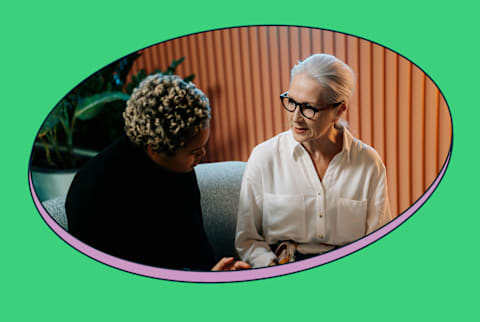Advertisement
Why Are People So Uncomfortable With Strong Women? Here’s What The Research Says


We’re in a moment in the cultural zeitgeist that seems to be embracing—and dare we say even celebrating—strong women. And we see this in all areas of strength.
At the gym, women are picking up weights to build strong bodies. With food and nutrition, women are adding more to their diet, focusing on foods that fuel their bodies rather than shrink it. At the office, women are holding more positions of power and advocating for their worth. In day-to-day life, women are taking up more space, allowing themselves to ask for what they want, and enjoying it all the while.
And seeing this evolution has been inspiring and enlightening, for myself and I’m sure many other women who have not always seen “strength” embraced with celebration.
But it hasn’t come without roadblocks and challenges—many that we deal with today. In the workplace, day-to-day life, and beyond, women have to navigate the complexities of showing strength, while still managing external expectations.
Meet the experts
Alice Eagly, Ph.D
Alice Eagly, Ph.D. .is an Emeritus Professor of psychology at Northwestern University. Her work focuses on the psychology of gender, especially sex differences in similarities in leadership, prosocial behavior, and sociopolitical attitudes. She is the author of Through the labyrinth: The truth about how women become leaders.
Jacqueline Stevens, MSW, LMSW
Jacqueline Stevens, MSW, LMSW, is a mental health professional on a mission to de-stigmatize mental health for all. She aims to encourage BIPOC women struggling to find inner peace and mental stability to learn culturally appropriate interventions to navigate the complexities of health, wellness, and peace.
Why strong women face push-back and obstacles
While society and gender equality have made significant strides, the unfortunate truth is that women have a harder time in positions of power than men do.
This bears out in research: A Yale 2021 study found that women aren’t promoted as frequently as men (despite receiving better performance ratings) because managers underestimated their leadership potential. Other research finds that “likeability” and “success” often have an inverse relationship for women. And that “assertiveness” is often mistaken for “aggressiveness” in women1.
But when I spoke to experts about why this happens, the answer isn’t so straightforward. It’s not that people outright dislike women in power—in fact, a lot of people say they want more examples of strong women or women in leadership positions. Rather, it’s actually a combination of several factors that make “strength” a more challenging quality to display as a woman.
The first is that many people are not as used to women in positions of strength and authority.
People are often intimidated by things they don’t know
“We're a little less familiar with women in these jobs or these positions of power,” notes Alice Eagly, Ph.D., emeritus professor of psychology at Northwestern University. Her work has looked into gendered dynamics at the workplace, and how women’s upward trajectory can be stunted by the myriad of obstacles (she likens this to a labyrinth, rather than a glass ceiling). “But that’s changing as we see so many women excelling at these jobs. When there are more women, those women educate the public that this is OK. So people are constantly being educated because they see women in these roles.”
Strength can also be seen as intimidating for other people when it challenges their own insecurities, notes therapist Jacqueline Stevens, MSW, LMSW.
I think people are intimidated by strong women largely in part because of their own insecurities. Often people perceive their strength as being problematic because it challenges their views of their own success.
“I think people are intimidated by strong women largely in part because of their own insecurities,” she says. “Often people perceive their strength as being problematic because it challenges their views of their own success.”
This push-back and obstacles are even more apparent for black women and women of marginalized groups.
“Being a Black woman, I believe that Black women and women of other marginalized groups reside at a very busy intersection of racism, sexism, and classism,” says Stevens. “And so black women and other marginalized groups have to experience the ‘strong women' phenomena very uniquely different from two other subgroups.”
She adds that this stress is exacerbated by the plethora of expectations Black women have to meet on a daily basis.
“And so we are trying to not only overcome racism, gender equality, and class equality, but black women are also being the central caretakers for their families,” she explains. “Black women are trying to care for others, while also trying to uphold and fight for their dignity. How do you do all of that at the same time?”
To combat this, women often have to balance “strong” characteristics with “soft” ones in order to succeed
Women are often less incentivized to display “strong” characteristics or openly embrace positions of power, as this is often met with challenges to their authority.
“Studies show that when women exhibit stereotypically masculine traits—such as assertiveness—we are less liked when compared with our male counterparts,” says Stevens.
“Or if you look at anger: In the workplace, education, or even sometimes at home, men receive a boost in their perceived status after expressing anger. When women express anger in these same environments, we are seen as less competent and more emotional.”
Adds Stevens, “When women do act more assertively, I believe we are breaking the feminine stereotypes that have become essential for female likability.”
This creates a complex dynamic that women have to navigate day-to-day.
“There are more dynamics women need to be aware of,” says Eagly. “In terms of gender stereotypes, we see men as the assertive, decisive sex—and women as the kinder, nicer sex. So for women, there are dangers for her if she starts ordering everyone around. Maybe a guy could get away with it, because people will think: Oh well that’s just the way guys are, right? But if a woman used that style—dominant, assertive, and the do-it-my-way attitude—that would just not work for a woman. She’d get a lot of resistance.”
Instead of showing open and outward displays of strength (as men are often encouraged to do), women have to be extra mindful about how they navigate these complex dynamics. This means women often have to balance the line between appearing strong and soft, assertive and understanding, or confident and humble.
Thus for women, “strength” becomes a balancing act.
“It becomes a constant game of fitting in. Women have to constantly ask themselves ‘What mask or facade do I have to put on in this environment to be accepted and liked?’” says Stevens. “So not only do women need to work harder to be assessed at the same level of competence as men, but we also need to work differently. We have to really tread a very fine line between masculinity and femininity. When men only have to worry about masculinity.”
And while this means women have to work smarter to weave through this dynamic, Eagly notes that it often makes for a better, stronger leader.
“Women tend to do leadership differently. They’re more compassionate. They’re warm. They’re communal. They ask questions about your family. They use nonverbal cues to show friendliness. So if women use some of the soft skills, along with assertiveness and authority, that is likely to work just as fine—if not better,” notes Eagly. “In fact, it’s usually a pretty winning strategy.”
Perhaps we need to rethink our understanding “strength”
When speaking to both experts, they both stressed that the solution isn’t that women should abandon all “softer” qualities and try to mimic what men have done in the past. But rather we all should emphasize embracing all qualities of strength, including vulnerability, compassion, empathy, and kindness. Confidence and assertiveness are valuable qualities, too, but they shouldn’t hold the monopoly on our ideas of strength.
It’s not weak to smile. It's not a bad thing to be considerate or think of the other person's feelings. These qualities make things go smoothly, and so there's nothing wrong with them.
“It’s not weak to smile. It's not a bad thing to be considerate or think of the other person's feelings,” says Eagly. “These qualities make things go smoothly, and so there's nothing wrong with them.”
And, too, strength is also when you are vulnerable—particularly for women of color.
“I’m passionate about debunking the ‘strong black women’ myth, because sometimes strength looks like acknowledging that you can’t do it all,” says Stevens. “I tell this to clients every single day—male or female, any race, and all ages—you have to know when you need a break.”
And ultimately, the thing you should worry most about is finding the strength to be authentically you.
“You have to push past your own insecurities and understand that not everyone’s going to like you. Not everyone has the capacity to receive how you show up in the world. But that doesn’t mean that there’s anything wrong with you,” says Stevens. “It very well may be something wrong with their ability to accept who you are and that is not your problem.”
Watch Next
Enjoy some of our favorite clips from classes
Enjoy some of our favorite clips from classes
What Is Meditation?
Mindfulness/Spirituality | Light Watkins
Box Breathing
Mindfulness/Spirituality | Gwen Dittmar
What Breathwork Can Address
Mindfulness/Spirituality | Gwen Dittmar
The 8 Limbs of Yoga - What is Asana?
Yoga | Caley Alyssa
Two Standing Postures to Open Up Tight Hips
Yoga | Caley Alyssa
How Plants Can Optimize Athletic Performance
Nutrition | Rich Roll
What to Eat Before a Workout
Nutrition | Rich Roll
How Ayurveda Helps Us Navigate Modern Life
Nutrition | Sahara Rose
Messages About Love & Relationships
Love & Relationships | Esther Perel
Love Languages
Love & Relationships | Esther Perel


















